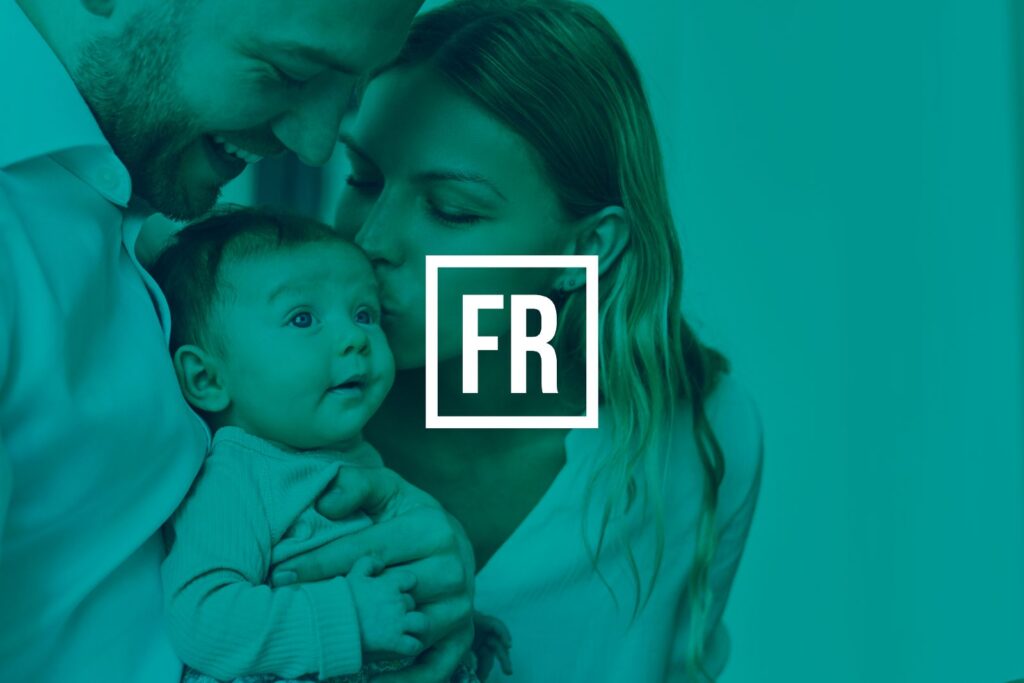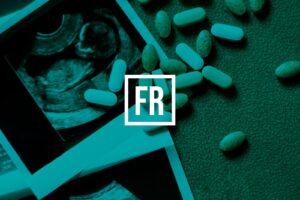I know this is important to egg donor recipients – otherwise I wouldn’t be writing about it. And I don’t want to mislead you into reading an entire article only to frustrate you in the final sentence. So here it is: Spoiler alert #1. Maybe the baby will look like you, or maybe they won’t! It’s really that simple.
In fact, that’s not so different from the answer I’d give if you were using your own eggs. However, since it is a common, interesting and important question, let’s spend some time unpicking it.
We’ve all heard people say: ‘He got his mum’s eyes’, ‘She really looks like her dad’, or something similar. As a young embryologist in my first week of training, I vividly recall meeting new parents visiting the IVF clinic with their baby. ‘Aw, he looks just like his Dad’, I said (thinking this was the right thing to say). I later learned the couple had used donor sperm. I’m not sure the baby looked especially like the father, and I have no idea what the sperm donor looked like. There was, I suppose, enough similarity between the baby and the father for me not to do a double take.
When someone asks: ‘Will the baby look like me?’, they might mean any or all of the following:
- Will the baby look like I did as a baby?
- Will the baby grow into a child resembling me as a child?
- Will the child grow into an adult that looks like me now?
- Will this child age in the same way as me?
Spoiler alert # 2: We cannot really know how you will look in the future, and does this really matter anyway?
The reason I make these distinctions is twofold: it is self-evident that babies look different from children and children look different from adults. Also, a lot can happen between baby and adulthood – most of which is down to our environment, how we live our lives and how we choose to change our appearance. For example, skin damage due to smoking or sun exposure can dramatically change your appearance.
However, maybe you’re really wondering whether the baby will grow up to look like it could have originated from your eggs. If you are dreading a lot of complicated genetics, don’t worry – I’ll keep it simple.
Physical characteristics are inherited from DNA provided by the egg and sperm provider. Two important things happen during reproduction. First, during sperm and egg development, the chromosomes (packages of DNA containing the genes) recombine. This is akin to shuffling a deck of cards – the same cards but in a different order. This means that each child can get a different hand of cards despite having the same parents – if this shuffling didn’t happen, all siblings would be like identical twins! Second, and this one is more obvious, each child is made up of a 50/50 mixture of genes from the egg and sperm. Put this way, an egg donor only has a 50% chance to influence appearance and, depending on the particular genes and their versions, this is not always an even split. Considering just these two factors means that the physical characteristics of the child may favour one parent, both parents or neither parent – everyone has seen a child that looks nothing like his/her parents. In the case of egg donation, the DNA again comes from the eggs and sperm but there is no genetic contribution from the intended mother. That means the baby may not resemble its birth mother.
However, if her partner’s sperm was used, the baby may well look more like its father anyway, because he and the baby share 50% of his genes.
Let’s consider the genetics behind physical appearance, focussing on visible traits known to have a strong genetic component (for example height and hair colour). Many other physical traits are influenced by genetics, but these ones are common and easily recognised (high heels and hair dye aside).
Given that each baby receives half its genetic make-up from the egg and half from the sperm, you might assume that physical characteristics can be simply averaged. However, a taller-than average man and a shorter-than-average woman won’t necessarily have a child who grows to an average of their combined heights. You may recall biology lessons in which you learned that brown hair colour (more of the pigment melanin) is dominant to blonde (less pigment) – the idea being that the gene responsible for making melanin comes in different versions (the highly active version making more melanin, resulting in brown hair). This story holds to a degree, but it really isn’t that simple. I wouldn’t guarantee anyone’s hair colour based on the parents.
Spoiler alert #3:
Blonde parents can have children with brown hair and hair colour can change over time. If you want to read more about this, I recommend this article. https://www.familyeducation.com/pregnancy/what-color-hair-will-my-baby-have
The story is not the same for eye colour and other characteristics, but you get the message that things are not quite as simple as we were told in school. To complicate matters further, another factor influencing gene activity is known as epigenetics. This is another opportunity for the environment to influence things. The environment in this sense can include exposure to stress, chemicals and the uterus; that unique environment that houses your developing baby throughout pregnancy. Rather than change hair or eye colour, the environment during your pregnancy is likely to influence other things such as later susceptibility to diseases including diabetes. It pays to look after yourself during pregnancy.
If you really want a child with blonde hair (like yours), then you should probably select a blonde egg donor and the ‘father’ will most likely also need to have blonde hair. At least, that will skew things towards having a blonde child.
At the risk of stating the obvious, the biological sex of your child will also influence their physical appearance. Not least because of the different sex hormones present. Young children in the same family, whether biologically male or female at birth, can often look remarkably similar. However, once they reach puberty, secondary sexual characteristics develop with a dramatic impact on appearance: The broad shoulders and facial hair in males, broader hips and breast development in females are triggered by different levels of circulating hormones (including testosterone and oestrogen). Different levels of circulating hormones in females at puberty and beyond can significantly alter their appearance (more prominent curves, fuller lips and so on). Some of these hormonal levels are genetically determined, but environment, once again, has a huge role to play.
Can I influence the appearance of the baby (make it look more like me)?
Yes, you can influence the baby’s appearance by selecting an egg donor with a similar natural physical appearance to you (in terms of height, hair colour, skin tone, ethnicity, eye colour and so on). However, and I cannot stress it enough, this will only skew things in favour of a particular set of physical traits. It is not a guarantee.
Most egg banks or egg donation programmes I know try to match the egg donor to the intended mother as far as possible – if that is requested. The availability and diversity of egg donors is better in some countries than others. For example, Black and Asian donors are scarcer in the UK compared with White donors, potentially impacting your chance of finding a close match. One provider uses algorithms to digitally analyse the recipient’s physical features (like using facial recognition software) to facilitate an extremely close match to a potential egg donor. This is interesting and might well influence the chance of a child looking more like you. However, this assumes a similarity between the appearance of the intended mother and egg donor, which has not been altered by surgery, disease, or other significant environmental factors. Also, this matching process cannot change any limitations of donor availability or a potentially dominant genetic contribution from the sperm.
Why are so many people concerned about the child’s appearance?
I’ve heard many distinct reasons and they all have validity:
- Some people are simply curious.
- Some choices are aspirational – “I want eggs from an Angelina Jolie look-alike” (yes, such websites do exist).
- Perhaps the fertility journey has been exceptionally painful – if the child doesn’t resemble you, this could be a constant reminder of why you needed egg donation.
- Maybe you just want to get on with the job of raising your child without family, friends or strangers constantly asking questions.
- If your plan is not to tell your child about their genetic origins – the more they resemble you, the less they will suspect.
Whatever your motivations for asking the question about appearance, these and other concerns can and should be properly discussed during ‘implications counselling’. This is mandatory in many IVF clinics. Rather than seeing it as an obstacle to your treatment or simply a tick-box exercise – please consider its potential value for sorting through issues you may or may not have considered.
A word of warning about Dr Google
In my research for this article, I wanted to better understand what was currently being claimed on the internet. Please treat Dr Google’s advice with caution. There is a lot of information but much of it is misleading, unverified, or not properly referenced. There’s no clear relationship between how highly a site ranks (how quickly you will find it) and the accuracy of the content. In addition, the small excerpt or teaser you see before clicking through to a site can be downright misleading. For example, I found a site asking: ‘Egg donation: will my baby look like me?’ The teaser said: ‘A resounding ‘yes’. I was astounded – was this a new area of genetics of which I was unaware? When I clicked the link, the question was actually: ‘Can I influence the baby’s health in the uterus?’ The answer to that question is indeed a resounding yes. However, influencing the baby’s health and its appearance are not the same thing at all.
I completely agree that you should do anything possible to improve the baby’s health and development while pregnant. I’d encourage all prospective mothers (including those using an egg donor) to consider carrier screening – a genetic test for those people providing the egg and sperm. Available in many donor programmes and clinics, carrier screening can significantly help reduce the incidence of serious genetic diseases (like cystic fibrosis, sickle cell anaemia, thalassemia and hundreds of others) in children born from donation. Sadly, not all donation programmes see this as a priority over other features such as physical appearance. But I’d be willing to bet that most prospective parents would choose genetic health over physical appearance every time.
In the end, there is no way to determine exactly what your child will look like. But there are many ways you can increase the chances that your baby will be healthy and have the best start in life.
You may also be interested in reading: Will the baby look like me? Donor egg IVF concerns.






